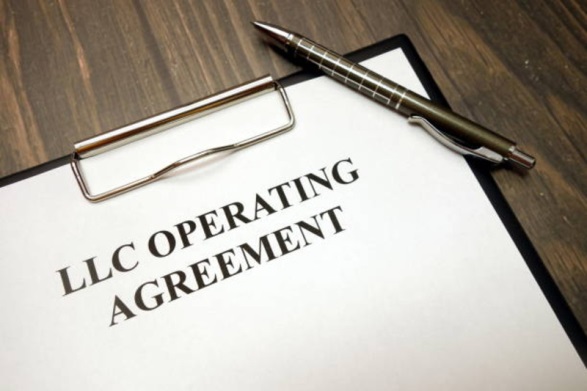
In business structures like a Limited Liability Company (LLC), understanding the role of a manager is essential for both smooth operations and achieving overarching organizational goals. This comprehensive guide delves into the specific responsibilities and importance of a manager within an LLC. We'll explore how they influence daily operations, decision-making processes, and strategic planning. Through a clear understanding of their role, we can decipher how a manager contributes to the success of an LLC, fostering growth, stability, and longevity in a competitive business landscape. Whether you're an aspiring manager, an LLC owner, or simply interested in business structures, this guide will provide insightful knowledge into the pivotal role of a manager in an LLC.
Defining the Role of a Manager in an LLC

The role of a manager in an LLC is multifaceted, encompassing various responsibilities and tasks. At its core, a manager is responsible for overseeing the daily operations of the business and ensuring that it runs smoothly. This includes managing employees, making important decisions, and setting strategic goals for the company.
In addition to these general responsibilities, a manager also has specific tasks related to the legal structure of an LLC. These tasks include maintaining accurate and up-to-date records, ensuring compliance with state and federal laws, and managing any necessary filings or paperwork.
As an LLC is a business structure that combines aspects of both a corporation and a partnership, the role of a manager may vary depending on the specific needs and goals of the company. However, there are certain overarching responsibilities that remain consistent across all LLCs.
The Importance of a Manager in an LLC
A manager plays a crucial role in the overall success and stability of an LLC. By overseeing daily operations and making important decisions, they are able to guide the company towards achieving its goals. They also act as a liaison between employees and owners, fostering effective communication and promoting a positive work culture.
Moreover, managers are responsible for setting and implementing strategic plans that align with the long-term vision of the LLC. This requires them to have a deep understanding of the company's strengths, weaknesses, opportunities, and threats. By utilizing this knowledge, they can make informed decisions that drive growth and ensure sustainability.
Developing Essential Skills as a Manager
To effectively fulfill their role, managers must possess a diverse set of skills and qualities. These include strong leadership abilities, effective communication skills, problem-solving capabilities, and strategic thinking. Additionally, managers must be adaptable and able to handle the ever-changing demands of an LLC.
It's also important for managers to continuously develop and refine their skills through continued education and professional development opportunities. By staying up-to-date with industry trends and best practices, they can enhance their effectiveness as a manager and contribute to the success of an LLC.
How a Manager Contributes to the Success of an LLC?
As we have established, the role of a manager is integral to the success of an LLC. They not only oversee daily operations and decision-making processes but also play a significant role in shaping the company's culture and values. By fostering a positive work environment, promoting effective communication, and setting strategic goals, managers contribute to creating a strong foundation for the success of an LLC.
Additionally, their ability to identify and address potential issues, make informed decisions, and adapt to changing circumstances helps ensure the long-term sustainability of the company.
Team leadership and management

Managers are responsible for leading and managing their team to achieve the goals of the LLC. This involves creating a positive work culture, providing guidance and support, and ensuring that employees have the necessary resources to perform their roles effectively.
Moreover, managers must also handle any conflicts or challenges that may arise within the team, promoting collaboration and cooperation among employees. By fostering a strong and cohesive team, managers can drive the success of an LLC.
Strategic planning and decision-making
One of the primary responsibilities of a manager is to set strategic goals and make important decisions for the company. This involves analyzing market trends, identifying opportunities and threats, and utilizing resources effectively to achieve long-term growth and profitability.
By taking a proactive approach to strategic planning and decision-making, managers can steer the company towards success while also adapting to changing market conditions.
Challenges Faced by LLC Managers
Managing an LLC comes with its own set of challenges that managers must navigate in order to ensure the success of the company. These challenges may include managing a diverse team, adapting to rapidly changing market conditions, and addressing legal or regulatory issues.
Additionally, managers must be able to balance the needs and expectations of both employees and owners while also prioritizing the best interests of the LLC
Best Practices for LLC Managers
To effectively overcome these challenges, there are several best practices that managers can follow:
- Continuously communicate with employees and owners to ensure alignment of goals and expectations.
- Foster a positive work culture by promoting open communication, providing recognition and feedback, and offering opportunities for growth and development.
- Stay updated on industry trends and regulations to make informed decisions.
- Utilize technology and automation to streamline processes and increase efficiency.
- Develop contingency plans to address potential challenges or obstacles.
By following these best practices, managers can effectively fulfill their role and contribute to the success of an LLC.
Conclusion
A manager plays a crucial role in the success of an LLC. They are responsible for overseeing daily operations, setting strategic goals, and managing resources effectively. By possessing essential skills and following best practices, managers can navigate challenges and guide the company towards long-term growth and sustainability. Additionally, their ability to foster a positive work culture and promote effective communication contributes to creating a strong foundation for the success of an LLC. Thus, it is clear that the role of a manager is vital in ensuring the overall success and stability of an LLC. So, aspiring managers must continuously develop their skills to effectively fulfill this crucial role and contribute to the success of an LLC.











